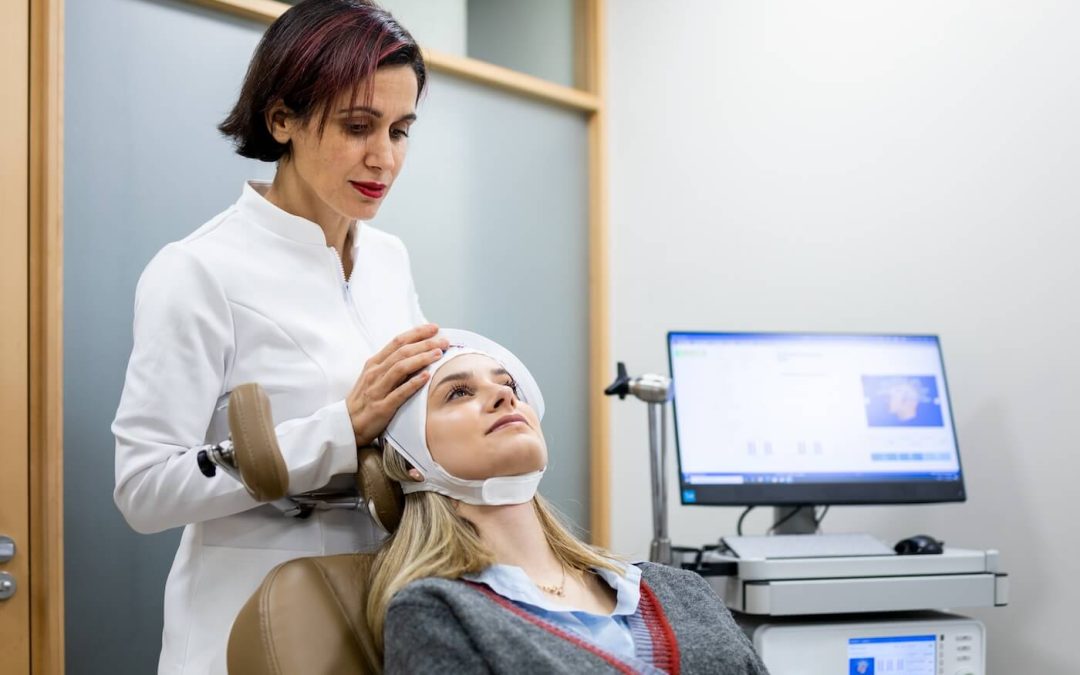Regain Control with Transcranial Magnetic Stimulation Therapy (TMS Therapy) at OptiMindHealth
A re you or a loved one struggling with persistent depression, anxiety, or another mental health condition that hasn’t responded to traditional treatments? At OptiMindHealth, we offer Transcranial Magnetic Stimulation therapy (TMS) — an innovative, FDA-approved therapy designed to help you achieve real, lasting relief.
What Is TMS Therapy?
Transcranial Magnetic Stimulation Therapy, or TMS therapy for short, is a non-invasive, drug-free treatment that uses gentle magnetic pulses to stimulate targeted regions of the brain associated with mood regulation. Unlike medication, which affects the entire body, TMS therapy delivers focused stimulation directly to underactive brain areas without systemic side effects.
OptiMindHealth’s TMS Therapy is:
- FDA-approved for treatment-resistant depression
- Safe and non-invasive, with no need for anesthesia
- Highly effective, with noticeable improvements in mood, focus, and energy
- Covered by most major insurance providers
Who Can Benefit from Transcranial Magnetic Stimulation Therapy?
TMS therapy is an excellent option for individuals who have not experienced relief from two or more antidepressant medications and are seeking a non-medication, non-surgical approach to mental health treatment. It is especially well-suited for those who prefer a solution with minimal side effects but meaningful, lasting results.
Transcranial Magnetic Stimulation therapy has been shown to help individuals struggling with a range of conditions, including Major Depressive Disorder (MDD), anxiety disorders, Obsessive-Compulsive Disorder (OCD), Post-Traumatic Stress Disorder (PTSD), bipolar depression, and even chronic pain or migraines. For many, it offers a renewed path to healing when traditional treatments have fallen short.
At OptiMindHealth, we tailor your care to your diagnosis, lifestyle, and goals, ensuring that TMS fits seamlessly into your healing journey.
What to Expect During a TMS Therapy Treatment
Transcranial Magnetic Stimulation therapy is a quick, non-invasive, and comfortable procedure that integrates easily into most patients’ daily routines. Designed to be stress-free and efficient, each session allows you to relax in a quiet environment while receiving targeted, evidence-based care. There’s no need for sedation, and most people are surprised by how manageable and straightforward the process is. Whether you’re heading to work afterward or continuing your daily errands, TMS therapy won’t slow you down.
Here’s what a typical session looks like:
- Get Comfortable: You’ll be seated in a comfortable chair in a peaceful setting. No anesthesia or sedation is required, and you’ll be fully awake and relaxed throughout the procedure.
- Precise Brain Mapping: During your first visit, the clinician will locate the specific region of your brain that will benefit from stimulation. This mapping ensures that the magnetic pulses are delivered to the right area for maximum effectiveness. Once established, this mapping typically remains consistent for future sessions.
- TMS Therapy Begins: A magnetic coil is gently placed against your scalp. The coil emits repetitive magnetic pulses, which feel like light tapping or clicking sensations. These pulses activate underactive nerve cells linked to mood regulation and other mental health functions.
- Back to Your Day: After the session, you can immediately resume normal activities with no downtime or recovery period. Many patients return to work, run errands, or continue with their day as usual.
Most patients undergo Transcranial Magnetic Stimulation therapy five days a week for four to six weeks, with each session lasting about 30 minutes. As treatment progresses, individuals often begin noticing improvements in mood, focus, and overall well-being.
Why Choose OptiMindHealth?
At OptiMindHealth, we go beyond standard treatment. Our expert clinicians provide:
- Personalized care plans tailored to your mental health history and daily life
- Cutting-edge equipment and evidence-based techniques
- Compassionate support every step of the way
Whether you’ve struggled with treatment-resistant depression or are exploring new options for anxiety, OCD, or PTSD, our team of board-certified psychiatrists and licensed mental health providers is ready to guide you toward recovery.
Proven Results with Transcranial Magnetic Stimulation Therapy
- 50–60% of patients with treatment-resistant depression report significant symptom reduction
- 1 in 3 patients achieve complete remission
- Many experience improved sleep, sharper focus, and a better overall quality of life
- Benefits often continue long after treatment ends
Get Started With OptiMindHealth Today
Don’t let mental health challenges keep you from living your best life. If you’re ready to explore a safe, effective, and modern approach to treatment, Transcranial Magnetic Stimulation therapy might be the answer you’ve been searching for.
Contact OptiMindHealth today to schedule your consultation and find out if TMS therapy is right for you.
Contact Us Today
If you have questions about TMS therapy, contact us by completing the form below. We will get you to the right team to help and will reach back out to you within the next business day. Please note that completing this form does not guarantee acceptance as a patient of OptiMindHealth, nor does it establish a provider-patient relationship. Any information provided on our website or in our responses cannot be considered medical advice or treatment. If you are experiencing a medical emergency or life-threatening situation, do not use this form; instead, call 9-1-1 for emergency assistance and follow up with your primary care provider.
Frequently Asked Questions (FAQs) About Transcranial Magnetic Stimulation Therapy
TMS Therapy FAQs: Cost & Coverage
How much does Transcranial Magnetic Stimulation therapy cost?
The cost of Transcranial Magnetic Stimulation therapy typically ranges from $6,000 to $15,000 for a full course of treatment without insurance. However, many major insurance companies, including Medicare, often cover TMS therapy for conditions like major depressive disorder (MDD) after other treatments have failed, significantly reducing the patient’s out-of-pocket expenses to a copay or deductible.
Is TMS therapy covered by insurance?
Yes, Transcranial Magnetic Stimulation therapy is often covered by insurance, including Medicare, for the treatment of Major Depressive Disorder (MDD) and sometimes for Obsessive-Compulsive Disorder (OCD). However, coverage is typically contingent on specific criteria being met, such as the patient having a diagnosis of a covered condition and having failed to find relief from a certain number of antidepressant medications and psychotherapy sessions. It is essential to check with your specific insurance provider to understand your policy’s requirements and potential out-of-pocket costs.
Do I need a referral for Transcranial Magnetic Stimulation therapy?
In most cases, yes, you will need a referral for Transcranial Magnetic Stimulation (TMS) therapy, particularly if you plan to use insurance to cover the cost. A referral from a psychiatrist or other mental health professional is typically required to ensure you meet the clinical criteria for treatment. While some private clinics may allow for self-referral, a doctor’s referral is almost always necessary to navigate the insurance authorization process.
TMS Therapy FAQs: Safety & Side Effects
Is Transcranial Magnetic Stimulation therapy safe?
Yes. TMS therapy is FDA-approved and considered very safe. Most patients experience only mild side effects like scalp discomfort or headaches, which typically subside quickly. Serious risks, such as seizures, are extremely rare (less than 0.1% incidence).
Does TMS therapy hurt?
Transcranial Magnetic Stimulation therapy is not generally considered painful, although a common side effect is mild to moderate discomfort at the treatment site.
What are the side effects of TMS therapy?
The most common side effects of TMS therapy are mild to moderate and temporary, including headaches, scalp discomfort, and facial muscle twitching. Serious side effects, such as seizures, are extremely rare but can occur. Most side effects improve after the first few sessions as the body adapts to the treatment.
Does Transcranial Magnetic Stimulation therapy cause memory loss?
No, Transcranial Magnetic Stimulation therapy does not cause memory loss. Clinical research has consistently shown that TMS does not negatively impact memory or cognitive function. In fact, some studies even suggest that by alleviating the symptoms of depression, which can include “brain fog” and concentration issues, TMS therapy may lead to improvements in memory and mental clarity.
Can I go back to my normal activities after a TMS therapy treatment?
Yes, you can typically resume your normal daily activities immediately after a TMS therapy session.
TMS Therapy FAQs: Efficacy & Results
How effective is TMS therapy?
TMS therapy is a highly effective treatment, particularly for individuals with treatment-resistant depression who have not found relief with other methods. Studies show that between 50-60% of patients respond to treatment, with significant symptom improvement, and about one-third achieve full remission.
Can TMS therapy treat depression?
TMS is ideal for individuals with treatment-resistant depression, such as those who haven’t responded to at least two antidepressants. It’s also an option for people with anxiety, OCD, PTSD, or migraines, especially if they prefer a non-drug alternative.
Can TMS therapy treat anxiety?
While Transcranial Magnetic Stimulation therapy is not currently FDA-approved for generalized anxiety disorder (GAD) on its own, it has been cleared for treating “anxious depression,” which is a common combination of major depressive disorder with comorbid anxiety symptoms.
Can TMS therapy treat Obsessive-Compulsive Disorder (OCD)?
Yes, TMS therapy is an FDA-approved treatment for Obsessive-Compulsive Disorder (OCD), particularly for adults who have not responded to traditional treatments like medication and psychotherapy.
Can TMS therapy treat bipolar (depression)?
While TMS therapy is not yet an FDA-approved treatment specifically for bipolar depression, it has been granted a “breakthrough device designation” by the FDA, which recognizes its potential and aims to expedite its review process.
How long does TMS therapy take?
A typical course of TMS therapy for depression involves daily sessions, five times a week, for a period of four to six weeks. Each individual session is relatively short, usually lasting between 20 to 40 minutes, with some newer protocols taking as little as three minutes.
How many TMS therapy treatments do I need?
Most treatment plans involve five sessions per week for 4 to 6 weeks, depending on your diagnosis and how you respond to therapy. Your provider at OptiMindHealth will tailor the schedule to your specific needs.
How long until I see results after TMS therapy?
You can typically expect to start seeing results from Transcranial Magnetic Stimulation therapy after two to four weeks of consistent treatment. However, the full benefits, including significant symptom improvement or remission, often become most apparent towards the end of the complete six to nine-week course.
How long do the benefits of TMS therapy last?
The benefits of TMS therapy can last for a significant amount of time, with a large number of patients experiencing relief for six months to a year or longer after completing treatment. However, the duration of benefits varies by individual, and some may require occasional “booster” or maintenance sessions to sustain the positive effects.
TMS Therapy FAQs: Technical Questions
Is TMS the same as ECT (Electroconvulsive Therapy)?
No, TMS (Transcranial Magnetic Stimulation) is not the same as ECT (Electroconvulsive Therapy), though both are brain stimulation therapies for depression. The key difference is that TMS uses magnetic pulses to gently stimulate a targeted area of the brain without anesthesia or inducing a seizure, while ECT uses an electrical current to intentionally induce a controlled seizure, which requires general anesthesia. This makes TMS therapy a non-invasive, outpatient procedure with minimal side effects and no recovery time.
What type of TMS machine or protocol does OptiMindHealth use?
OptiMindHealth utilizes the CloudTMS machine. We use different protocols for depression and OCD, depending on the patient’s needs.
TMS Therapy FAQs: Qualifications & Experience
Who is a good candidate for Transcranial Magnetic Stimulation therapy?
A good candidate for TMS therapy is typically an adult with a confirmed diagnosis of Major Depressive Disorder (MDD) who has not found sufficient relief from standard treatments like antidepressant medications or psychotherapy. Candidates should also not have any metal implants or devices in or near their head, such as a pacemaker or cochlear implant, due to the magnetic nature of the treatment.
What is OptiMindHealth's experience and background with TMS therapy?
All of OptiMindHealth’s providers in Boulder, CO are trained in administering the procedure and all commonly used protocol variants. Our training on the theory and application of the procedure is extensive.
Recent Posts on TMS Therapy

What is TMS?
As more Americans turn to medication for mental health care, it’s becoming clear that traditional treatments don’t work for everyone. This fact is prompting a growing interest in new and innovative therapies. One such breakthrough is Transcranial Magnetic Stimulation,...

The COVID-19 Crisis and Getting Help
The coronavirus (COVID-19) crisis is unprecedented, and affects not only our physical health and daily lives, but also our mental health. The first case of COVID-19 was discovered in China's Wuhan city, and has since been spreading worldwide. The severity of the...

Group Therapy Can Help
Group therapy is counseling for a small group of people struggling with similar concerns. It is often a rewarding experience, and suitable for many people. As such, it can help those struggling with social isolation, depression, and the effects of trauma. In some...

Dialectical Behavior Therapy
DBT is a type of counseling that helps us learn how to seize the moment, cope more easily with stress, improve relationships, and regulate emotions. So, it is helpful for many of us create more stability in our lives. It was at first intended for those with borderline...





